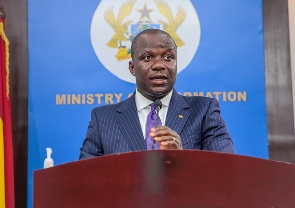 Lands and Natural Resources Minister, Samuel Abu Jinapor
Lands and Natural Resources Minister, Samuel Abu Jinapor
The quest to make the country a mining destination of choice for investors on the continent will need the collective support of all stakeholders in the industry, Minister of Lands and Natural Resources, Samuel Abu Jinapor, has said.
The vision, which he observed remains a critical focus of government, is based on ensuring that all mining and mining-related activities – from exploration to downstream production and from research to innovation – are centred.
But to make it realisable, the minister said: “Requires that we promote both large- and small-scale mining industries, and invest in value addition to ensure the mining industry has adequate linkages to other sectors of the economy”.
To this end, he indicated that government is fully committed to this course; hence his call for collaboration to build a responsible, viable, sustainable and environmentally-sound mining industry.
The Lands and Natural Resources Minister, who was speaking at the World Gold Council Workshop opening session in Accra, urged large and small-scale mining companies to learn to mutually co-exist.
“Large-scale mining companies which use highly skilled methods must work closely with small-scale miners to ensure that they, also, mine responsibly.
“We cannot have one aspect of the industry promoting environmentally-sound practices while the other is destroying the gains made. We must work together, and with host communities, to safeguard our environment; and provide opportunities for host communities to reduce the appetite for venturing into dangerous activities like illegal mining,” he stated.
The small-scale mining sector currently contributes about a third of Ghana’s total gold production, making it a significant part of the local mining industry. However, as a result of its impact on the environment in recent years, it has become associated with environmental degradation and water-pollution.
But the minister said it is the position of government that small-scale mining can, and must, be done sustainably and responsibly so as to contribute meaningfully to the national economy.
“It is for this reason that government has been implementing several policies and programmes aimed at promoting responsible and sustainable small-scale mining,” he added.
Furthermore, he disclosed that government is considering implementing an annual environmental audit, and posting Reclamation Bonds for small-scale mining companies.
The three-day World Gold Council Workshop is being organised on the role of large-scale gold mining companies in promoting responsible artisanal and small-scale gold mining. The event is being held under the auspices of the World Gold Council and Ghana Chamber of Mines.
The Chief Executive Officer (CEO) of Minerals Commission, Martin Ayisi, also speaking at the programme noted that they have digitalised the applications and renewals for mineral rights, permits and licences for both large- and small-scale mining companies.
This, he said, forms part of efforts by the Minerals Commission to expedite the licencing process and generally ensure effective and efficient service delivery.
Also, a Senior Advisor of the World Gold Council, Mr. Edward Beckham, appealed for countries to adopt responsible and sustainable ways of exploiting their resources.
Among other things, he said, the workshop will lead to an exchange of knowledge and expertise on effectively harnessing mineral resources for the country’s growth while protecting the environment.